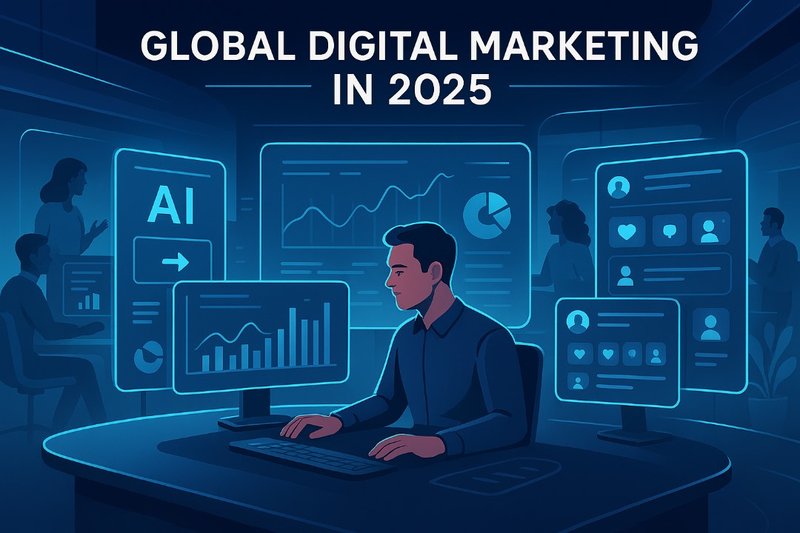Introduction
Digital marketing in 2025 is no longer just about being online—it’s about mastering a hyper-personalized, data-driven, and AI-empowered ecosystem. The rapid evolution of consumer behavior, the dominance of mobile-first experiences, and the rise of immersive technologies like augmented reality (AR) and virtual reality (VR) have redefined how brands connect with audiences. Marketing strategies are now built on predictive analytics, real-time engagement, and omnichannel consistency, ensuring that every customer interaction is both seamless and relevant. In this new era, businesses must go beyond traditional tactics, embracing emerging platforms, AI-powered tools, and privacy-conscious data practices to remain competitive in an increasingly saturated digital landscape.
Digital Marketing Strategy in 2025: A Complete Global Guide
The Shift to AI-Powered Personalization
In 2025, artificial intelligence has moved beyond being a “nice-to-have” tool—it is now at the core of digital marketing. Brands are leveraging AI to analyze massive data sets, predict consumer behavior, and deliver hyper-personalized content in real time. Machine learning models track individual customer journeys across devices and channels, allowing businesses to deliver targeted ads, emails, and recommendations that feel tailored to each user.
For example, a fashion retailer in Ghana can now use AI-driven predictive analytics to understand buying trends and instantly match them with seasonal demands—just as a retail giant in the U.S. or Japan would. This level of sophistication bridges the gap between local businesses and multinational corporations.
Key tip: Integrate AI tools like ChatGPT for content generation, Jasper for copywriting, and Persado for emotional language optimization into your marketing stack.
The Rise of Video-First Marketing
Global data shows that over 82% of all internet traffic in 2025 is video-based. Short-form videos on TikTok, Instagram Reels, and YouTube Shorts dominate engagement metrics. Brands are producing bite-sized, highly shareable content that captures attention in under 5 seconds.
However, the focus is not just on entertainment—value-driven videos like product explainers, tutorials, and customer testimonials are thriving. Live streaming has also evolved, with AI tools automatically translating and captioning content for global audiences.
Pro tip: Keep videos between 15–45 seconds for social platforms and under 2 minutes for explainer videos. Always include accurate captions for accessibility and multilingual reach.
Data Privacy and Compliance
With regulations like the GDPR (Europe), CCPA (California), and LGPD (Brazil) setting stricter standards, respecting customer privacy is non-negotiable in 2025. Users now expect transparency on how their data is collected, stored, and used.
Digital marketers must ensure all tracking tools comply with international privacy laws, use cookie consent banners, and allow users to opt out easily. This builds trust—a critical factor for customer retention in an era of data skepticism.
Global application: If you run campaigns across multiple countries, implement geo-targeted compliance so that users automatically see the right privacy notices for their location.
Omnichannel Engagement
In 2025, customers interact with brands across multiple touchpoints—social media, email, chatbots, in-store kiosks, and even voice assistants. A successful digital marketing strategy must unify these experiences so customers feel the same brand tone and messaging everywhere.
Example: A user browsing an e-commerce store in Germany who abandons their cart should get a personalized follow-up email, see a retargeting ad on Instagram, and receive an in-app notification if they return—without feeling spammed.
Execution tip: Use CRM systems like HubSpot or Salesforce to sync customer interactions across all platforms in real time.
Search Engine Optimization (SEO) Evolution
Search algorithms in 2025 prioritize search intent and user experience over keyword stuffing. Voice search optimization is crucial, as 50% of all searches are now voice-activated. Marketers must adapt their strategies to include conversational keywords and natural language queries.
Best practices for global SEO:
-
Create content in multiple languages for your top markets.
-
Use structured data to improve search visibility.
-
Optimize for Core Web Vitals to ensure fast loading times and mobile responsiveness.
The Power of Community-Driven Marketing
In an age of ad fatigue, people trust people—not brands. User-generated content (UGC), online communities, and influencer collaborations are driving more conversions than traditional ads. Communities on Discord, Reddit, and niche Facebook Groups have become valuable spaces for authentic engagement.
Brands are investing in micro-influencers who have smaller but highly loyal audiences, ensuring campaigns feel authentic and localized while still connecting to a global audience.
Global insight: Ensure your influencer partnerships reflect cultural sensitivity and diversity for better reception in multiple markets.
Measuring What Matters
With the explosion of data, marketers in 2025 must focus on meaningful metrics rather than vanity numbers. Engagement quality, customer lifetime value, and conversion rates across different channels offer deeper insights than likes or impressions alone.
AI-powered analytics dashboards help brands forecast revenue, segment audiences, and adjust strategies in real time.
Action step: Replace outdated KPIs with performance metrics aligned to business goals.
Accessibility and Inclusivity as Core Values
International digital audiences include users with different languages, devices, internet speeds, and accessibility needs. Brands must design campaigns that cater to all—this includes screen reader-friendly websites, high-contrast visuals, and captions or transcripts for all multimedia content.
Global standard checklist:
-
Always provide alt text for images.
-
Use color schemes that meet WCAG 2.1 AA standards.
-
Offer multiple language options or translation features.
Preparing for What’s Next
The digital marketing landscape will continue to evolve with AI, immersive technologies like AR/VR, and new privacy regulations. Marketers who adopt a data-driven yet human-centered approach will remain ahead. The brands that thrive in 2025 will be those that blend cutting-edge technology with genuine human connection across borders.




Comments (0)
Leave a Comment
No comments yet. Be the first to comment!